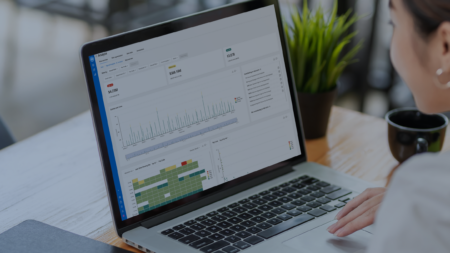The New Reality of Financial Risk Management
Financial risk management is no longer just about compliance and loss prevention—it’s about enabling enterprise growth. Today’s CFOs are tasked with balancing risk-adjusted decision-making while ensuring operational efficiency, regulatory compliance, and strategic agility. However, legacy risk management models—rooted in fragmented data, manual oversight, and static assessments—are failing to keep pace with modern financial complexity.
Market volatility, evolving regulatory landscapes, and the explosion of enterprise data require a shift from reactive risk management to proactive risk intelligence. AI-driven financial risk management provides CFOs with a structured, scalable approach to identifying hidden risks, optimizing financial controls, and improving decision-making.
This article explores how AI transforms financial risk management, enabling finance leaders to drive resilience, efficiency, and strategic execution in an unpredictable business environment.
Why Traditional Financial Risk Management Falls Short
Legacy risk frameworks rely on sample-based reviews, periodic audits, and static models that fail to capture the full scope of enterprise risk. Key challenges include:
- Siloed Financial Data – Disparate systems across ERP, CRM, and financial reporting tools create blind spots in risk assessment.
- Reactive Risk Monitoring – Traditional methods rely on lagging indicators, making risk detection slow and inefficient.
- High Cost of Compliance – Manual risk assessments drain time and resources while failing to catch unknown risks.
- Limited Workforce Bandwidth – Finance teams are stretched thin, focusing on operational firefighting rather than strategic risk intelligence.
The result? CFOs are forced to make high-stakes decisions based on incomplete or outdated information, leaving enterprises vulnerable to financial misstatements, fraud, and regulatory penalties.
How AI Transforms Financial Risk Management
AI-driven financial risk management eliminates the constraints of traditional risk models by providing continuous risk monitoring, anomaly detection, and predictive insights. MindBridge’s AI-powered platform enables CFOs to:
1. Identify and Mitigate Unknown Risks
Unlike static models that only detect known risks, MindBridge’s unsupervised machine learning surfaces unknown anomalies across all financial transactions. By analyzing the full dataset—rather than a small sample—AI uncovers patterns of risk that traditional reviews miss.
- Detects financial misstatements in general ledgers and subledgers.
- Flags unusual transaction patterns that indicate fraud or process failures.
- Surfaces discrepancies in reconciliations before they impact financial statements.
2. Enhance Internal Controls and Compliance
Regulatory scrutiny continues to increase, placing pressure on CFOs to strengthen financial oversight. AI-driven audits move beyond manual sampling, providing 100% transaction coverage and automated risk scoring.
- Strengthen SOX compliance by identifying control gaps in financial reporting.
- Automate anomaly detection to ensure transaction accuracy.
- Reduce audit preparation time by streamlining compliance reporting.
3. Optimize Cash Flow and Liquidity Planning
Liquidity risk remains a top concern for CFOs, especially amid economic uncertainty. AI-powered risk intelligence enables finance leaders to anticipate cash flow fluctuations and make proactive capital allocation decisions.
- Scenario-based stress testing simulates liquidity risk under different economic conditions.
- AI-driven forecasting improves working capital management.
- Proactive vendor risk assessment ensures supplier stability and payment accuracy.
4. Increase Workforce Efficiency Through AI-Augmented Risk Intelligence
AI is not replacing finance teams—it’s enhancing their ability to focus on high-value decision-making. MindBridge’s AI-driven risk analysis eliminates manual bottlenecks, allowing CFOs to optimize financial operations without adding headcount.
- Reduce manual reconciliation workload, freeing teams to focus on strategic initiatives.
- Accelerate month-end close cycles by automating risk-based financial reviews.
- Enable cross-functional collaboration by integrating AI-driven insights into enterprise workflows.
AI-Powered Risk Intelligence: The CFO’s Competitive Advantage
The modern CFO is responsible for more than just financial reporting—they are enterprise architects, responsible for aligning risk management with business strategy. AI-powered financial risk management provides CFOs with the insights needed to:
- Make risk-aware strategic decisions that drive profitability and resilience.
- Ensure regulatory compliance without increasing operational overhead.
- Strengthen financial controls while reducing costs and improving accuracy.
- Future-proof financial operations by integrating AI-driven risk intelligence across the enterprise.
The Future of Financial Risk Management Is AI-Driven
MindBridge empowers CFOs with continuous risk intelligence, automated anomaly detection, and AI-driven financial oversight—ensuring that financial risk management is no longer a reactive process, but a strategic advantage.
Ready to transform your financial risk management strategy? Book a demo today and see how AI-powered risk intelligence can drive smarter, faster, and more confident decision-making.



